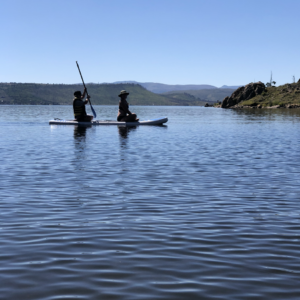Make Content Creation Easier on Yourself
Websites can be beautiful, and a well-designed site can definitely make an impression with visitors and customers. But when you get down to it the content on your website is much more important than those color blocks and images.
Content is so valuable because it’s not just read by those visitors, it’s also read by search engines to determine what your site is about and when to show it.
The problem is all that content has to come from somewhere, and it can take a damn long time to do it right. If you’ve got a website, that’s most likely on you!
Because of the time it takes to do content creation and content marketing correctly, many of our clients hire us to help. Now, that may seem a bit counterintuitive to some. We’re in the business of digital marketing, not [insert any client industry here], so wouldn’t it take us more time to write than those clients?
Yes, there’s research needed to gather all the points, cross-check the info, and nail down all the minute details. Yes, that happens for each and every article. But with some practice and some smart planning you can make content creation less scary and less time consuming.
With no plan in place, every time you sit down to write an article, you’re forced to start from scratch. We went through this phase ourselves and the result was a multitude of reactionary posts. We’d find something relevant and give our take on it. They were relatively easy to write because it was all news and opinion: “Last week, Company A did this and I think it’s great!” They weren’t bad posts per se, but they lacked real substance, and the while the writing wasn’t hard, the research was hell; scouring the web each time to find a topic that I could rant on.
Eventually, we took some time and put together a simple plan aimed at helping us keep up:
1. Determine a Posting Schedule
I’m not a huge fan of working out, and much like working out, consistency is extremely important to a successful blogging plan. If there’s no set schedule (Tuesday is leg day and Wednesday is blog day), it’s too easy to brush the work aside.
Without a schedule, you may never “miss” a post, but that’s because there’s never any real assumption that a post will be written at any given time. Post are published when they’re created and they’re created whenever you feel like it.
To fix this, sit down and determine a schedule for yourself. By setting strict parameters, (e.g. articles are posted every Monday at 10am Mountain time) you can create a sense of necessity and accountability. It doesn’t matter if no one is out there at 10am, frantically clicking refresh in anticipation of your next post (hi Mom!); the mere fact that you know it’s supposed to go out, will help push you to make it happen. Sure it may seem like a typical New Year’s Resolution that’s bound to fade away, but when you understand the benefits of regular content updates it’s easier to push yourself to meet your goals.
2. Create an Idea Bank
Knowing when you’re going to post is just part of the battle. You can tell yourself that you’re going to post a blog every Wednesday but unless you’re planning ahead, Wednesday will roll around and you’ll be desperately searching for a topic to write on. (We know because we’ve been there.)
When you create a schedule, it can help to outline some topics you want to focus on, too. For us, we have pretty clear cut core services that make nice content categories.
Using a handful of categories as a basic backbone, you can create an idea bank that everyone in your business can add to. Whether it’s an interesting article to use for inspiration or a common question from clients that deserves a thorough response, ideas can be added to the list for consideration under their specific category.
A collection like this takes much of the hassle out of picking topics since you can quickly browse through options, and because everyone is involved it often inspires you to write about topics you may not have come up with on your own.
3. Start Before You Start
While a schedule and an idea bank are a start, they don’t do much to cut down on the actual time spent writing, which is the one of the common hurdles of content creation. The solution is simple: start working on your posts long before you ever begin writing.
It doesn’t have to be intensely thorough, but having even a basic outline of points can speed up your writing process when the time comes to create. For many of my own posts, I outline my subsections over a month in advance along with a sentence or two of detail for each… then I forget about it. When I return to the idea to begin writing, a huge chunk of my work is already done; I’m able to write a post more quickly than usual because the path is already laid out for me.
Outlining posts ahead of time can also provide another layer of help while you’re writing: Not only do people love the ‘scan-ability’ of ‘list posts,’ with their short points and big subheads, but they’re easier to read too.
Anyone who wrote papers in school can attest to the challenge of transitions. Moving fluidly from one point to another is essential for readability, but writing those effectively can be tough. Articles that rely on lists and bullets provide a work-around that can drastically cut down on time.
No matter what tips or tricks you may use, it all comes down to your determination to write and maintain a blog. At the risk of sounding cliche, things do get better: as you write more you’ll eventually find your voice and become more comfortable with the process of creating regular content.
If you already have a blog that needs some love, start putting together a schedule and collecting ideas for future posts. If you don’t have one yet, start brainstorming topics and see if there are enough to justify a blog on your site. Once you commit though, stick to your schedule as much as possible. As personal trainers like to say, “Stopping for one day is a break. Stopping for two days is stopping!”
Other Articles
Mastering Black Friday Cyber Monday Campaigns: Strategies for Outdoor Retail Brands
Black Friday Cyber Monday (BFCM) has become a pivotal period for businesses across various industries, and the outdoor retail sector...
Why Leveraging Discounts Can Give Your Business a Competitive Edge
Consumers today have an infinite amount of information at their fingertips. Amid the sea of brands and products they have...
Navigating the Off-Season: Marketing Strategies for Outdoor, Overlanding, and Camping Brands
The world of outdoor adventure, overlanding, and camping is fueled by the passion for exploration, nature, and the thrill of...



